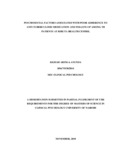| dc.contributor.author | Anunda, Keziah A | |
| dc.date.accessioned | 2019-01-29T11:26:11Z | |
| dc.date.available | 2019-01-29T11:26:11Z | |
| dc.date.issued | 2018 | |
| dc.identifier.uri | http://hdl.handle.net/11295/105848 | |
| dc.description.abstract | Background: It is estimated that a third of the world population is infected with Tubercle bacilli making tuberculosis a major cause of increased morbidity and mortality. Kenya is ranked 13th among the 22 countries with high burden of TB in the world and the 5th in Africa (WHO, 2013). The therapeutic regimes recommended by WHO are highly effective. Unfortunately, poor adherence to these medications is a major challenge to successful treatment of patients diagnosed with TB which requires a high compliance rate. A need for multi-dimensional combined adherence interventions integrated in health care systems locally and internationally is therefore critical for these patients. Though factors such as socio-economic characteristics and demographic characteristics have been previously associated with poor adherence or non-compliance to TB therapy regimes, psychosocial factors have been rarely investigated among TB patients despite the fact that mental ill health has far reaching consequences for the health outcome of these Patients. Study Objective: The purpose of this study was to investigate the psychosocial factors associated with poor adherence to TB therapy among patients on treatment and follow up. Study Site: The study was conducted at the Riruta Health Centre. Methodology: The study used a cross-sectional descriptive research design. The Kessler10-Psychological distress scale, a socio demographic questionnaire and Medication adherence rating scale was used in collecting the data. The sample size of respondents that was engaged in the study was 153 patients on Anti-Tb Medication aged 18yrs and above.
Data Management & Analysis: Data collected from the respondents was coded, entered and analyzed using the Statistical Package for Social Sciences (SPSS) version 23. The frequencies and correlations were presented in tables.
Results: Prevalence rate of poor adherence at Riruta Health Centre is high at 36.6%. There was no association between socio-demographic profile of the participants and poor adherence to the treatment regimen with P values above 0.05. Alcohol was significantly associated with non-adherence at a P value of 0.005. There was no relationship between emotional/ socio- demographic factors and poor adherence among TB patients on treatment and follow-up with P values above 0.05.
Conclusion: There was a high rate of poor adherence to treatment among patients attending Tuberculosis clinic at Riruta Health Centre. There was no association between socio-demographic profile of the participants and poor adherence to the treatment regimen. Although quite a considerable number of participants were found to be having psychological distress, there was no association between having the disorder and adherence. Another conclusion drawn from the study was that alcohol consumption was the only psycho-social factors that was associated with poor adherence. Generally increased consumption of alcohol predicted poor adherence to TB treatment adherence. Finally, there was no relationship between emotional/ socio- demographic factors and poor adherence among TB patients on treatment and follow-up.
Recommendation: The study recommends the following; Special attention on adherence counseling, Psycho-education of patient and care giver, Alcohol screening and Information about development of TB treatment resistant strains. | en_US |
| dc.language.iso | en | en_US |
| dc.publisher | University of Nairobi | en_US |
| dc.rights | Attribution-NonCommercial-NoDerivs 3.0 United States | * |
| dc.rights.uri | http://creativecommons.org/licenses/by-nc-nd/3.0/us/ | * |
| dc.title | Psychosocial Factors Associated With Poor Adherence to Anti Tuberculosis Medication and Follow-up Among Tb Patients at Riruta Health Centre. | en_US |
| dc.type | Thesis | en_US |
| dc.description.department | a
Department of Psychiatry, University of Nairobi, ; bDepartment of Mental Health, School of Medicine,
Moi University, Eldoret, Kenya | |



